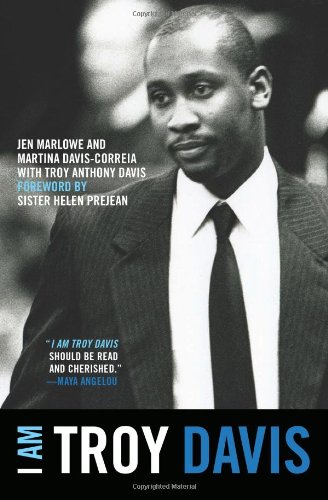*First published in Fellowship Magazine Summer 2014 // http://forusa.org/fellowship/2014/summer-fall/book-review-i-am-troy-davis/13032
On the evening of September 21, 2011, I stood outside of the Georgia Diagnostic and Classification Prison. In front of me, row after row of police officers stood dressed in riot gear, slapping their batons against their shields and daring anyone to make a move. The protest cries of “I AM TROY DAVIS!” filled the air. Shortly after 11:08 p.m., word reached us that Troy Davis had been executed by the State of Georgia. “They executed an innocent man!” shrieked out a fellow protestor.
During the extended campaign to stop this execution, innocence was the major word on activists’ lips. Jen Marlowe and Martina Davis-Correia’s book picks up this theme, using private recollections and exhaustive collected evidence to make the case that Troy Davis was innocent and wrongfully executed. Davis did not own a gun. Davis was not involved in the incident. Davis did not fire the gun that killed Officer Mark Allen MacPhail. Most witnesses who placed him at the crime were coerced by the police and have since recanted. Racial tension in South Georgia necessitated a quick charging of Davis.
The evidence casts enormous doubt on the conviction of Troy Davis, but the bigger story seems to be the inhumanity of the death penalty. My current state of Texas and many others dehumanize their populations to try to satisfy some carnal sense of vengeance and misguided justice.
The God that many of the pious persons carrying out these executions and I claim to serve demands we love our neighbor as our self. It is hard to love your neighbors as your self when you force them into a legal process that is unjust, racist, classist, and a whole world of -ists and -isms, strap them to a gurney, murder them, create victims of all parties involved, and brutalize individuals and families that are left to ponder who are the victims and who are the perpetrators in such a process.
The beauty of I Am Troy Davis rests not in its authors’ claims of innocence, but in their ability to illustrate the human cost of the death penalty. We are drawn in to witness the unbelievable stress and dehumanization forced upon the Davis family. We are brought close as the family experiences the heartbreak of legal defeat after defeat, repeatedly attempts to address the MacPhail family, seeks more legal support, and ultimately are forced to sit outside the Georgia Diagnostic and Classification Prison as their beloved uncle, brother, and friend is executed. Apart from the attention, this story is not too different from many tales of execution.
I would not be so invested in fighting the death penalty if not for Troy Davis. Throughout his case, I kept thinking: Surely, someone will do the right thing. Yet at each step, the injustice continued.
Never was I more heartbroken by a body of people than by the Georgia Board of Pardons and Parole. Growing up in Clayton County, I knew a member, our former District Attorney Bob Keller. He was a regular attendee of First United Methodist Church in Jonesboro, Georgia. When the board issued its decision, relief from execution was denied. I couldn’t understand it. I knew that Bob and all of the board members claimed to be Christians. Did anyone remember Jesus’ demand that we love our neighbors as our self?
I Am Troy Davis begs us to be more human and humane. As we read this text, may we never be able to shake its painful images of injustice and execution, may we be emboldened to declare that murder is murder no matter who pulls the trigger, and may we learn to live out a love that dictates that life always has value regardless of the circumstance.
Amen.













